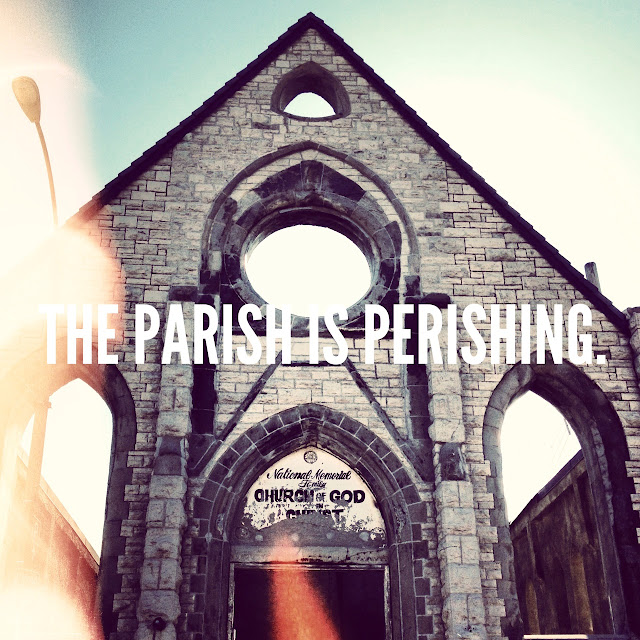The Parish is Perishing
Because the structure of the traditional, parish-model, church in St. Louis hasn’t developed with the ever-changing cultures and surroundings, how it is able to effectively develop, disciple, and engage with its community is suffering. This crisis is leading the average St. Louis church into a free-fall. Churches are closing nearly every month, as young worshippers are leaving the church in droves. Older worshippers are becoming more and more home-bound, moving to fixed incomes, and can no longer support church budgets, building campaigns, and missions. Because the average worshipper in St. Louis is 61 years old (and getting older), the church is literally perishing.
The spider-model of church structure has also prevented adequate development of future leaders. The spider-model thrives with the paid-professionals, and as more and more congregations are laying off their staff(s), it is apparent that the model of Pastor or Priest determining belief, behavior, and belonging, has also prevented the laity from effectively developing a future plan, discipling others, or engaging their communities. The heads are being cut off, and the organisms are dying.
Mosiacs, Busters, and the Future Church of St. Louis
Gabe Lyons, in his book Un-Christian, paints a picture of American Christian culture and perception by his survey work with Barna. He shows the "Mosaic" generation (born 1984-2002) and "Buster" generation (born 1965-1983) as a growing un-churched population. He focuses on the perceptions that have caused this fallout, as well as the reality of the future demographics of the “church,” should no changes be made to its definition, practice, and inclusion. Lyons shows how changing the perceptions, definitions, and practices of the church among 16-35 year olds can dramatically change the future (Lyons 2007, 17-19).
Lyons’ surveying is especially important to the church-culture in St. Louis, because it correlates almost perfectly with the disconnect in the average age of those that claim to be churched. Lyons shows an aging American-church, with a growing, younger un-churched population. This is a portrait of St. Louis. His surveying asked 16-35 year olds for their top ten perceptions of the church. Christianity's image problem is not merely the perception of young un-churched individuals either. Those inside the church see it as well -especially Christians in their early 20's and 30's (Lyons 2007, 18). The survey of perceptions is overwhelmingly negative (Lyons 2007, 29-30):
Anti-homosexual: Un-churched-91% Churched-80%
Judgmental: Un-churched -87% Churched -52%
Hypocritical: Un-churched -85% Churched -47%
Old-fashioned: Un-churched -78% Churched -36%
Too involved in politics: Un-churched -75% Churched -50%
Out of touch with reality: Un-churched -72% Churched -32%
Insensitive to others: Un-churched -70% Churched -29%
Boring: Un-churched -68% Churched -27%
Not accepting of other faiths: Un-churched -64% Churched -39%
Confusing: Un-churched-61% Churched-44%
Table 2.0
Lyons continues, by better defining the backgrounds of those surveyed (Lyons 2007, 31-32):
1. Perceptions not formed in vacuum, most Mosaics and Busters have enormous experience with Christians and Christianity.
2. Experiences at churches, relationships, input from other religions, and what their parents have told them are all major factors.
3. Secular media does affect how outsiders view Christianity, but less than you might think. 9% of outsiders and 1/5th of young churchgoers said that Christianity has received a bad reputation from television and movies.
4. Painful encounters with the faith.
5. These painful encounters are more common with young people than the older.
Table 3.0
Background information matters, because it speaks to the structure of the organization. Because St. Louis is primarily a spider-structure, younger Christians have little to no voice in affecting the change that will positively influence their futures. Not only is there a disconnect between the young and the church leadership, but there isn’t a working culture to develop, disciple, and engage younger (potential) leaders. As I have shown in previous sections, the traditional parish model places the formation of all belonging, belief, and behavior in the hands of the dwindling paid staff.
Lyons’ data also shows us that in previous generations of churchgoers, these starfish models haven’t been as important, or even seen as necessary. However, moving out of modernism and into post-modernism, culture is changing, and the Mosaics and Busters think, communicate, learn, and interact, very differently than their predecessors. Finally, understanding the perceptions of Mosaics and Busters allows us to understand St. Louis in 2012. The average age is 38 years old, and the future of the church culture lies in the fate of these groups.
**more to come in a few days!
Peace,
Ross







